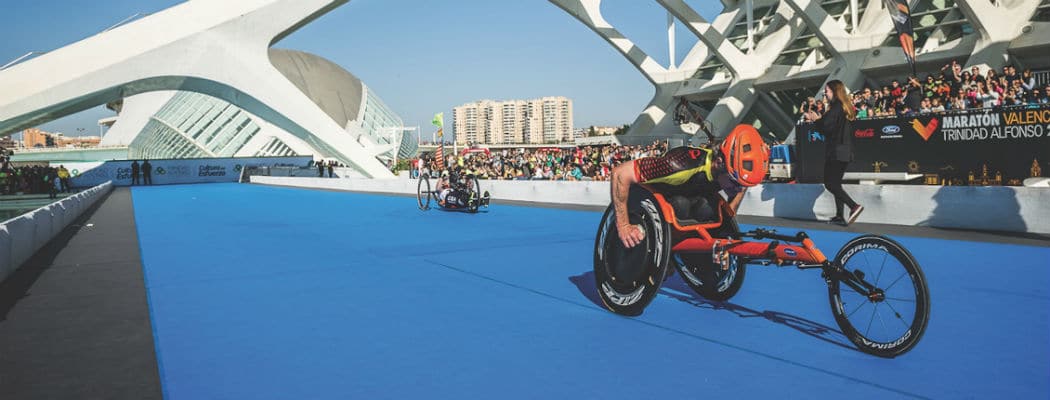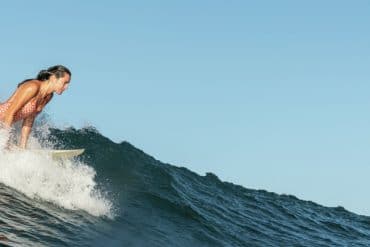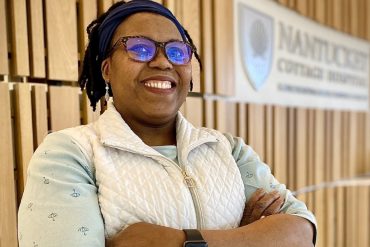Thirteen-time Paralympic champion Chris Waddell returns to Nantucket this August.
 In the eyes of many, Chris Waddell is a super hero. After being paralyzed from the waist down at the age of twenty in a skiing accident, this Massachusetts native went on to become one of the most decorated athletes in the history of the Paralympics, earning a total of thirteen medals — five of them gold — in both the winter and summer games. And that was just the beginning of his winning streak.
In the eyes of many, Chris Waddell is a super hero. After being paralyzed from the waist down at the age of twenty in a skiing accident, this Massachusetts native went on to become one of the most decorated athletes in the history of the Paralympics, earning a total of thirteen medals — five of them gold — in both the winter and summer games. And that was just the beginning of his winning streak.
People magazine named him one of the “50 Most Beautiful People.” The Dalai Lama gave him the Unsung Hero of Compassion Award. He was inducted into the Paralympic Hall of Fame and the Skiing Hall of Fame. And in 2009, Waddell became the first paraplegic to reach the summit of Mount Kilimanjaro almost entirely unassisted. This August, Waddell returns to Nantucket for the second year in a row to talk about what is perhaps his greatest endeavor of all. Waddell is on a mission to redefine what it means to be disabled in the twenty-first century.
When Waddell wheeled into my office last August, I was quick to try and help him navigate around the furniture. “Can you get over that?” I asked, nodding to the carpet. What an absurd question, I immediately thought to myself. This was a guy who had wheeled his way to the top of the highest point in Africa — through boulder fields and up steep scree — yet here I was worried that he couldn’t push himself over a half-inch thick piece of carpet. And that’s exactly the subconscious misperception of disability that Waddell is trying to rid society.
 “As adults, we’ve formed our biases about disability, whether they’re informed or not,” he told me recently. To break this circle of bias, Waddell has been touring around the country telling his story at hundreds of schools as part of his foundation, One Revolution. “Kids’ minds are open,” Waddell says. “They want to ask questions. They’re not bound by political correctness as we are as adults. They’re willing to ask, ‘Why are you in a wheel chair?’”
“As adults, we’ve formed our biases about disability, whether they’re informed or not,” he told me recently. To break this circle of bias, Waddell has been touring around the country telling his story at hundreds of schools as part of his foundation, One Revolution. “Kids’ minds are open,” Waddell says. “They want to ask questions. They’re not bound by political correctness as we are as adults. They’re willing to ask, ‘Why are you in a wheel chair?’”
By showing impressionable kids the incredible heights those with disabilities can reach, Waddell hopes to bring about an overall shift in society’s perception of disability. “The objective is for them to see the individual for their potential and not their limitations,” he says. Since founding One Revolution, Waddell has spoken to nearly 400,000 students. This year, he enlisted seven other para-athletes to amplify the message. “The hope is to reach a million students a year.”
But it hasn’t always been medals for Waddell. Before his accident, he failed to even finish a ski race, let alone end up on a podium. In many ways, Waddell’s success as an athlete came in the wake of tragedy. In 1988, during Christmas vacation, he was skiing recreationally with his brother when his binding popped free and sent him into a tumble. The fall broke two vertebrae and rendered Waddell paralyzed from the waist down.
 He spent two months in the hospital, during which time he dropped fifty pounds and couldn’t lift himself out of bed. “I couldn’t walk and had lost many prospects for my future,” Waddell wrote in his must-read book, Things I Want To Remember Not To Forget. “Yet, it was the most powerful that I’ve ever been because my life achieved a simplicity that I’d never experienced.” Less than a year after his accident, Waddell was back on the mountain learning to carve turns in a sit ski. Not long after that, he became one of the fastest mono-skiers in the world.
He spent two months in the hospital, during which time he dropped fifty pounds and couldn’t lift himself out of bed. “I couldn’t walk and had lost many prospects for my future,” Waddell wrote in his must-read book, Things I Want To Remember Not To Forget. “Yet, it was the most powerful that I’ve ever been because my life achieved a simplicity that I’d never experienced.” Less than a year after his accident, Waddell was back on the mountain learning to carve turns in a sit ski. Not long after that, he became one of the fastest mono-skiers in the world.
Waddell’s life became about beating the odds and overcoming what others deemed impossible. “I felt a responsibility to stretch the imagination of the general public with every race,” he wrote. After becoming the fastest mono-skier in the world, Waddell turned his attention to the summer games and became a wheelchair sprinter, winning silver in the 200 meter in the 2000 Paralympic Games in Sydney, Australia. Then came the off-sport accolades — the recognitions from everyone from the Dalai Lama to People magazine. Waddell’s triumphs elevated him to superstar status, and with it, a new, unexpected challenge emerged.
“I felt a responsibility in a lot of ways to a lot of people as a superhero,” he says. “So many people said to me, ‘You’re my inspiration.’ And so I thought that meant I really couldn’t have a bad day.” The pressure of having to live up to this superhuman status weighed heavily on Waddell. He feared humiliation and public failure. All this came to a head during one of his most audacious objectives: climbing Kilimanjaro.
 Waddell trained for months to tackle Africa’s highest peak. He worked with engineers to custom design a four-wheel hand bike equipped with off-road tires and a winch to pull himself up the steepest sections of the 19,341-foot climb. He enlisted guides, porters, and filmmakers to capture the entire journey. “When I was climbing Kilimanjaro, it felt like it was a goal that was bigger than me myself,” he says. “There are hundreds of millions of people in the world with physical disabilities… I felt responsible to a lot of other people who don’t necessarily have a voice.”
Waddell trained for months to tackle Africa’s highest peak. He worked with engineers to custom design a four-wheel hand bike equipped with off-road tires and a winch to pull himself up the steepest sections of the 19,341-foot climb. He enlisted guides, porters, and filmmakers to capture the entire journey. “When I was climbing Kilimanjaro, it felt like it was a goal that was bigger than me myself,” he says. “There are hundreds of millions of people in the world with physical disabilities… I felt responsible to a lot of other people who don’t necessarily have a voice.”
For seven arduous days, Waddell grinded up the dusty path to the summit. Pedaling with his arms while lying on his stomach, he finished each day covered in dirt and completely exhausted. As the trail got steeper and his wheels failed to gain purchase in the loose scree, wooden boards were placed painstakingly under his wheels for each pedal stroke. Waddell demanded that no one help him up the mountain. He wanted to reach the top completely unassisted.
But then, he and his team reached a steep boulder field separating him from the final camp. Despite arduous attempts to set up Waddell’s winch to help have him crank his way up, he couldn’t budge. Hours ticked by. Fearing that they wouldn’t get to camp before sun down, the lead guide decided that Waddell would need to be pushed up to the next camp. Waddell was crushed. Because he wasn’t going to get to the top entirely on his own power, he felt like a failure.
 “The biggest gift the mountain gave me was allowing me to separate myself from the superhero image that I created since I left the hospital,” he says. “I’d become remarkable in ways that I always craved, but it prevented me from understanding who I really was.” On the final stretch to the summit, Waddell began to glean the ultimate lesson from climbing Kilimanjaro. “Part of it is that you don’t have to do everything yourself,” Waddell says. “Asking for help can be the most empowering thing that we do. When we ask for help, together we can achieve a whole lot more… I feel like I’m continuing to learn about that as I move forward.”
“The biggest gift the mountain gave me was allowing me to separate myself from the superhero image that I created since I left the hospital,” he says. “I’d become remarkable in ways that I always craved, but it prevented me from understanding who I really was.” On the final stretch to the summit, Waddell began to glean the ultimate lesson from climbing Kilimanjaro. “Part of it is that you don’t have to do everything yourself,” Waddell says. “Asking for help can be the most empowering thing that we do. When we ask for help, together we can achieve a whole lot more… I feel like I’m continuing to learn about that as I move forward.”
Waddell’s remarkable journey to the summit of Kilimanjaro was captured in a compelling documentary titled “One Revolution”, which was shown at the Atheneum last year. Waddell will return to the island this August to speak at private gatherings and continue his mission of reaching young people. Along with fighting to change society’s perception of disability, Waddell strives to achieve a level of truth and transcendence with each of his presentations. He takes off the super hero cape and reveals a vulnerability that makes his message universal. As he says, “It’s a lifetime pursuit that gives purpose to the decisions I make everyday.”






